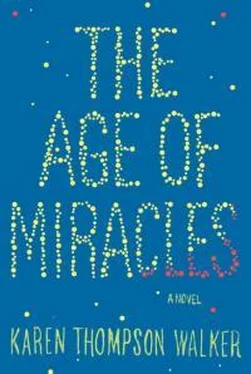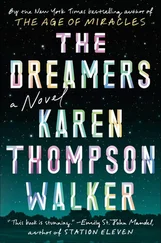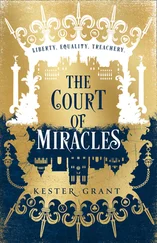“I’m going down to the beach after school to see them,” said Seth. The wheels of his skateboard spun slowly as he shifted it from one hand to the other. “Want to come?”
“What?” I said.
Of all the strange phenomena that befell us that year, maybe nothing surprised me more than the sound of that small question rolling out of Seth’s Moreno’s mouth: “Want to come?”
I can still remember the red diamond pattern of the library carpet, the way the opening and closing of the library doors caused the overhead flags to swing back and forth above our heads.
“Okay,” I said.
“Okay, then,” he said.
And that was it. He turned and walked away.
On the way home, we sat separately on the bus. We both stepped off with the usual kids at our stop. It was hot and hazy in the neighborhood. Dust blew across the empty lot. The other kids scattered. I drifted in Seth’s direction. I thought he might throw his skateboard on the asphalt and fly down the hill without me. Perhaps I’d misunderstood. Maybe this was some kind of joke.
Instead, he turned, squinting, and said, “We can drop our backpacks at my house on the way.”
We were quiet as we walked. We communicated with our feet, mine following his down the sparkling sidewalk to his house.
I did not tell my parents where I was going. They wouldn’t be home from work for hours anyway.
Seth lived two streets away from us in a beige ranch-style with a rusted basketball hoop overhanging the garage. The front yard had turned to dirt. A row of terra-cotta pots stood empty of flowers.
The front door was unlocked, and we walked right in, leaving our backpacks in the hall, which was cluttered with newspapers and laundry. Thick quilts served as makeshift blackout curtains. An oxygen tank and its accompanying tubing lay tangled like wreckage in one corner. Seth’s mother had died in this house.
“Want a Coke?” he said.
“Okay.”
We drank them at the kitchen table.
His father was at work, he said, he was there most of the time. He was a bioengineer, Seth explained, at work on a new type of corn.
“If it works,” he said, “it’ll be able to grow without light.”
Seth knew a shortcut through the canyon to the beach. It was a steep and sandy trail littered with pinecones and shaded by limestone bluffs. The smell of the canyon was the same as ever, like soil and sage, but the colors of California were turning starker. All the greens were fading away. Most everything was dying. Still, the canyon buzzed with beetles and mosquitoes and flies—whatever the birds had once eaten was flourishing, unhunted.
“Watch out for snakes,” said Seth.
I liked the way he walked: loose and unhurried, a boy who knew his way. I was the girl walking with him, so I walked that way, too.
The trail swung around a corner, and the beach came into view. It was low tide—lower than I’d ever seen it. The slowing was throwing off all the tides. Hundreds of feet of sea floor lay exposed, the sand ribboned black with bits of iron. These were the ocean’s insides, revealed.
We stopped on the trail for a moment watching the ocean, side by side, our hands so close, they almost touched.
We crossed the coast road, ducked beneath the caution tape, and cut through the space between two ruined mansions, wet from the last high tide. One house had collapsed like a cake. Its walls were lined with barnacles. Sea anemones carpeted the front steps.
I bent to take off my shoes.
“Look,” said Seth.
There they were: the whales, dark and still, prehistoric in size.
A small crowd of people had gathered on the beach. Good Samaritans were dumping salt water on the whales. Other volunteers were returning from the distant tide, swaying with buckets full of fresh seawater.
We could hear the whales breathing, a slow rising and falling. We listened. We watched. They were social creatures, the whole group distressed by the stress of any one individual. It was obvious they were dying. But we couldn’t help it. We were mesmerized.
Seth picked up two empty plastic cups from the sand. They were bits of ancient litter. He handed one to me.
“We have to do something,” he said. “Come on.”
We ran barefoot down to the water, cups in hand. It was a long run. The mud sucked our feet. Creatures slithered unseen beneath my toes. Dead fish sparkled in the sun as my hair whipped in the wind. When we reached the lapping water and looked back, the humans on the beach were barely visible. Their hairline arms and hairline legs fluttered soundlessly around the whales. The only noise was the churning of the ocean.
We rushed to fill our cups with water and then ran back across the thick band of mud. We looked for the driest whale, the one most in need. We found it at the edge of the group, and we imagined that it was older than the others. Its skin was striped white with scars. I shooed flies from its eyes, one eye at a time. Seth poured our meager water supply over its head and into its mouth. He petted its side. I felt an urgency like love.
“Hey, kids,” someone called from behind us. It was a man in a beach hat, an empty white bucket swinging from one hand. A gust of wind drowned out what he said, so he shouted it again: “That one’s already dead.”
We were solemn as we climbed back up through the canyon. We were hot and exhausted. It was the twenty-third hour of daylight. The sun showed no signs of sinking.
“It’s the magnetic field that’s doing it,” said Seth.
“What is?”
A strong wind blew through the canyon, kicking up dust and dried leaves.
“That’s why the whales are beaching themselves. They use the magnetic field for navigation, and now it’s decaying because of the slowing.”
I glanced at the sky, a smooth, unblemished blue.
“You can’t see it,” Seth said. “It’s invisible.”
Those were only the first of the whales. Hundreds more would soon wash ashore on the California coastline. Then thousands. Tens of thousands. More. Eventually, people stopped trying to save them.
“It’s not just the whales who need the magnetic field,” said Seth as we arrived at the edge of the canyon and took our first steps on paved ground. “We need it, too. My dad says that all the humans would die without it.”
But that day I could hardly hear him. My mind was elsewhere. I was a little bit in love. I’d spent an entire afternoon with Seth Moreno.
The eucalyptus first arrived in California in the 1850s. Imported from Australia, the seeds crossed five thousand miles of open ocean before reaching the soil of our state. The trunks were supposed to be a miracle wood, perfect for a hundred different purposes, railroad ties especially. But the wood turned out to be useless. It curled as it dried and split when nailed. The state’s eucalyptus industry went bust before it ever boomed.
But the trees remained—and they spread. They were everywhere in my youth, and in my grandfather’s youth, too. Their slender silhouettes once swayed along the coastal canyons, the beach bluffs, the soccer fields. Their long leaves floated in the swimming pools and the gutters. They drifted along the banks of saltwater lagoons. For over one hundred and fifty years, the eucalyptus thrived in California, surviving every calamity: earthquake, drought, the invention of the automobile. But now the trees were suffering en masse. The leaves were losing their color. Orange sap oozed from openings in the trunks. Little by little, they were dying.
On the morning of my twelfth birthday, I was lying awake in the dark, recalling in detail all the moments of the previous day’s events: the way Seth squinted in the sun as we walked through the canyon, the tenderness in his hand as he petted the backs of the whales, the sound of his voice at the end of the day, and those words— see you later —as he turned and jumped on his skateboard, pushing off hard with one foot and then sailing sideways down the hill, his white T-shirt rippling in the wind behind him. I had to remind myself again and again that it had really happened: He had invited me .
Читать дальше












